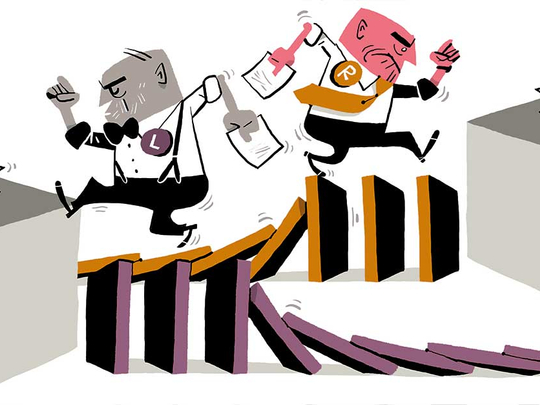
In the last year there have been four touchstone elections in the West: two in Britain, one in the US, one in France. Two of these were disasters, one was nearly so, and one was a huge relief. None went according to script.
Maybe that’s because we have lousy pollsters and lacklustre mainstream politicians. There’s also the matter of reckless voters.
As of today, it seems that Theresa May would cobble together a coalition government — just barely — with a small northern Irish party, which should keep her in office for a while longer. In every other sense she’s a humiliated politician, who squandered a huge lead in a lousy campaign against a vile opponent.
Sound familiar?
The real winner in Britain’s election is Jeremy Corbyn, who led the Labour Party to a 32-seat gain over its disastrous electoral showing in 2015. Corbyn is a man whose only notable concession to conventional politics has been a necktie. He has done as much to shove the Labour Party to the nasty left as Donald Trump has shoved the Republican Party to the ugly right.
I have long noted the ways in which Trump has done this. Conservatives who failed to call him out — most of them, I’m sorry to say — have become accomplices in this project of their own intellectual and moral debasement.
What about Corbyn? The Labour leader “has created what some have referred to as a ‘safe space’ for those with vile attitudes toward Jewish people” —that’s according to a report from a UK Parliamentary Committee published last year. One of his closest advisers, Seumas Milne, is among Vladimir Putin’s most prominent apologists in the UK. Corbyn himself has called Nato a “danger to world peace.” That sounds familiar, too.
It used to be the case that the respectable left disdained Corbyn for all the reasons cited above, and then some. It won’t be long before this same left begins to embrace him and everything that goes with him, much as the Paul Ryans of the world have embraced Trump and Trumpism.
Why? The word that usually serves to explain it is “normalisation.” As Raskolnikov puts it in Dostoyevsky’s Crime and Punishment, “Man gets used to everything, the scoundrel!”
But there’s no need to normalise what you already like. All you need to do is raise it to the surface. Neither Corbyn nor Trump would have come as far as they did if they hadn’t seized control of their parties by stroking some inner ideological id.
They wouldn’t have gotten far if disdain for comparative bores such as David Miliband or Jeb Bush hadn’t been matched by a fetish for “authentic” jerks. We now have a western politics in which the centre bends toward the fringe, not the other way around.
Nor would they have succeeded if the party faithful hadn’t forgotten, or never learned, why the warmed-over Marxism or dumbed-down nationalism each championed was so thoroughly discredited. Throw in last year’s Brexit vote and Marine Le Pen’s success in reaching the second round in the French election, and the breadth of civic ignorance becomes even clearer.
“As the memory of the Second World War, the Holocaust and the Gulag fades, so too does the antipathy to the illiberal ideologies that spawned Europe’s past horrors,” writes James Kirchick in his superb if dismaying book The End of Europe: “This is evidenced in the rising electoral success of populist authoritarian parties of the extreme left and right, none of which have anything new to say, yet claim the mantle of ideological innovation and moral virtue.”
It took three generations to lose the lessons of pre-war isolationism. It took two to ignore the benefits of post-war European integration. If Corbyn’s rise is something to go by, it has taken just a single generation to forget the sins of the far left: anti-Semitism masquerading as anti-Zionism; anti-Americanism masquerading as pacifism; fellow-travelling with dictators and terrorists masquerading as sympathy for the wretched of the earth.
All this is on the voters. It’s easy to come up with reasons for why populists, bigots, radicals, xenophobes, and useful idiots are now in — or edging closer to — power throughout the West. But democracy is a system in which people are only accountable to themselves. The recklessness of their leaders is a result of personal choices at the ballot box, not impersonal social or economic forces.
The news isn’t all bad. Corbyn still fell 64 seats short of a parliamentary majority. Trump’s approval ratings are at 39 per cent. Regrets? The Brexiters have a few. And Emmanuel Macron may yet provide evidence that, at least in France, there is gravity, energy, excitement and even sexiness at the political centre. The West hasn’t walked over the ledge, yet. We’re only dancing at the cliff’s edge.
— New York Times News Service
Bret Stephens is an American journalist who won a Pulitzer Prize for commentary in 2013.









